Table of Contents
Have you ever noticed more hair on your brush than usual and wondered why? Hair loss, also known as alopecia, is something many people deal with, and it can be quite frustrating. While it’s normal to shed around 50-100 hairs per day, excessive hair loss may indicate an underlying issue. One major factor that often gets overlooked is vitamin deficiency. But is a lack of vitamins really the reason behind thinning hair, or are there other contributing factors? Let’s dive in!
Why is Understanding Vitamin Related Hair Loss Important?

Vitamins and minerals play a crucial role in maintaining healthy hair. Deficiencies in essential nutrients such as Vitamin D, Biotin (B7), Iron, and B12 can lead to hair thinning, excessive shedding, and even long-term damage to hair follicles. However, it is important to take a true and fair approach when discussing hair loss. While vitamin deficiency is a significant factor, it is not the sole reason behind hair loss. Addressing nutritional gaps alone may not completely reverse hair loss if other underlying causes are at play.
Is Vitamin Deficiency the Only Cause of Hair Loss?
To fully understand the role of vitamins in hair health, we must also acknowledge the broader causes of hair loss. Here are some of the most common contributors:
Male and female pattern baldness is hereditary and linked to a sensitivity to dihydrotestosterone (DHT), which causes hair follicles to shrink over time.
Hormonal Changes
Pregnancy, menopause, and thyroid imbalances can significantly impact hair growth cycles. Conditions like polycystic ovary syndrome (PCOS) increase androgen levels, leading to hair thinning.
Stress & Psychological Factors
- Chronic stress triggers telogen effluvium, a condition where hair follicles enter a resting phase prematurely.
- Conditions like trichotillomania, a compulsive hair-pulling disorder, can also contribute to hair loss.
Medical Conditions & Autoimmune Disorders
- Alopecia areata, an autoimmune condition, causes sudden patchy hair loss.
- Thyroid disorders, lupus, and diabetes can also disrupt the hair growth cycle.
Nutritional Deficiencies
- Iron deficiency anemia reduces oxygen supply to hair follicles, leading to hair shedding.
- Lack of Biotin (B7), Vitamin D, B12, and Zinc weakens hair structure.
- Crash diets, eating disorders, and malabsorption conditions (e.g., celiac disease) can further deplete essential nutrients.
Hair Care Practices & External Damage
- Overuse of heat styling tools, harsh chemical treatments (dyes, relaxers, perms), and tight hairstyles (traction alopecia) can contribute to hair breakage and thinning.
- Scalp infections like ringworm (tinea capitis) can also lead to patchy hair loss.
Medications & Treatments
- Certain medications like chemotherapy drugs, antidepressants, and beta-blockers list hair loss as a side effect.
- Radiation therapy can cause permanent hair loss in the treated area.
Environmental & Lifestyle Factors
- Pollution, exposure to toxins, and smoking can damage hair follicles and reduce scalp circulation.
- Sudden weight loss, poor diet, and lack of sun exposure can further contribute to hair thinning.
So, What This Means for You?
When it comes to hair loss, there’s no one-size-fits-all answer. While vitamin deficiencies can be a key factor, they are just one piece of a much larger puzzle. If you’re experiencing hair loss, the best approach is to identify all the possible causes before jumping to conclusions.
In the next section, we’ll break down the specific vitamins linked to hair loss, how they impact your hair, and what you can do to prevent deficiencies.
What is the Link Between Vitamin Deficiency and Hair Loss?
Have you ever wondered if your diet could be the reason behind your hair thinning? The connection between vitamins and hair health is real, and deficiencies in key nutrients can disrupt your hair growth cycle. But is vitamin deficiency alone enough to cause hair loss? Let’s break it down.
How Do Vitamins Affect Hair Growth?
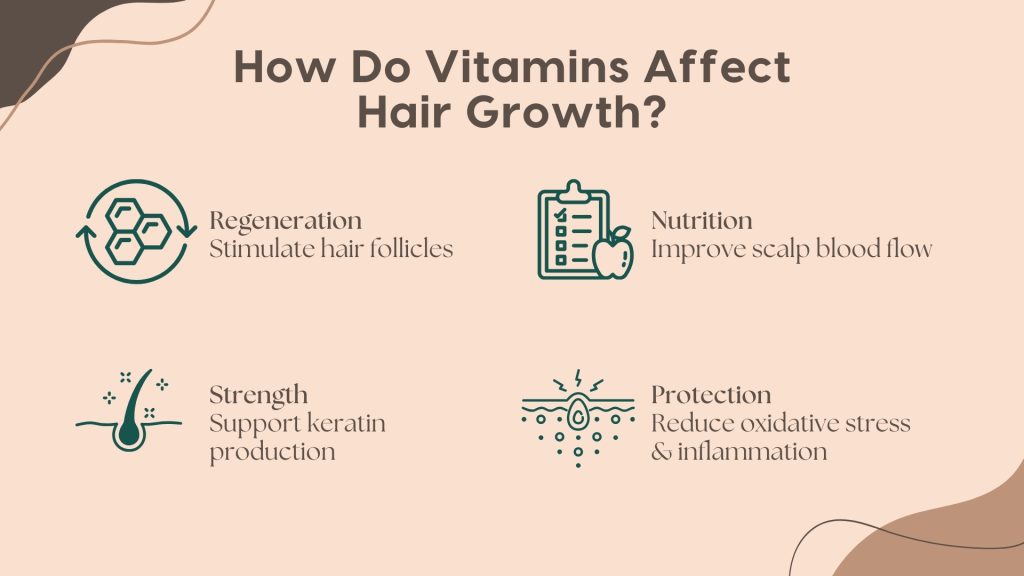
Hair growth is a complex process that depends on the hair follicle’s ability to generate new cells. Vitamins act as essential co-factors in this process, helping to:
- Stimulate hair follicle regeneration
- Support keratin production, which strengthens hair strands
- Improve blood circulation to the scalp, delivering oxygen and nutrients
- Protect hair follicles from oxidative stress and inflammation
When key vitamins are lacking, hair growth slows, shedding increases, and follicles may weaken. But before you rush to buy supplements, it’s important to understand which deficiencies truly impact hair health and how to address them effectively.
Which Vitamin Deficiencies Are Linked to Hair Loss?
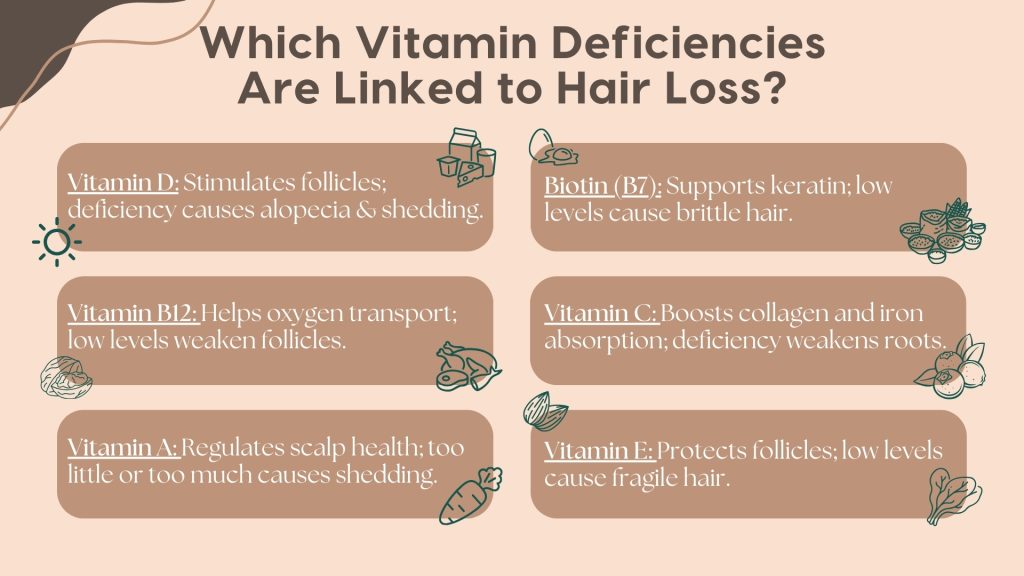
Who Can Benefit?
Is Vitamin D Deficiency Making Your Hair Thin?
Why It Matters? Vitamin D helps stimulate hair follicles and plays a role in the natural hair growth cycle.
Deficiency Impact: Low vitamin D levels have been linked to alopecia areata (patchy hair loss) and telogen effluvium (excessive shedding).
How to Fix It? Spend more time in the sun, consume fortified dairy products, and consider vitamin D supplements if tested deficient.
Can a Lack of Biotin (Vitamin B7) Cause Hair Loss?
Why It Matters? Biotin is essential for keratin production, the protein that makes up hair.
Deficiency Impact: While true biotin deficiency is rare, low levels may lead to brittle, weak hair and increased shedding.
How to Fix It? Foods like eggs, nuts, and whole grains are rich in biotin. However, unless diagnosed with a deficiency, biotin supplements may not offer noticeable benefits.
Does Vitamin B12 Deficiency Lead to Hair Shedding?
Why It Matters? B12 supports red blood cell formation, which helps transport oxygen to hair follicles.
Deficiency Impact: Low B12 can lead to anemia, which in turn reduces oxygen supply to hair follicles, weakening them.
How to Fix It? Increase intake of lean meats, fish, dairy products, and fortified cereals.
Is Vitamin C Crucial for Hair Strength?
Why It Matters? Vitamin C aids in collagen production, which strengthens hair roots, and helps the body absorb iron (another key nutrient for hair growth).
Deficiency Impact: Brittle hair and excessive shedding.
How to Fix It? Eat more citrus fruits, guavas, bell peppers, and berries.
Can Vitamin A Deficiency (or Excess) Affect Hair Growth?
Why It Matters? Vitamin A regulates cell growth and sebum production, which keeps the scalp healthy.
Deficiency Impact: While low levels may lead to a dry scalp and weak hair, excess Vitamin A can also cause hair shedding.
How to Fix It? Balance your intake by consuming carrots, sweet potatoes, and leafy greens, but avoid excessive supplementation.
Could a Lack of Vitamin E Be Weakening Your Hair?
Why It Matters? Vitamin E is an antioxidant that helps protect hair follicles from oxidative stress.
Deficiency Impact: Uncommon, but when present, it may contribute to scalp inflammation and increased hair fragility.
How to Fix It? Eat more almonds, sunflower seeds, and spinach.
What About Minerals Like Iron and Zinc?

- Iron: Essential for red blood cell function. Low ferritin (stored iron) levels below 50 ng/mL can contribute to telogen effluvium.
- Zinc: Supports hair tissue repair and growth. A deficiency may lead to increased shedding, but excessive intake can also damage hair.
- How to Fix It? Consume red meat, lentils, pumpkin seeds, and seafood.
How Can You Identify a Vitamin Deficiency That’s Causing Hair Loss?
Have you ever looked at your hairbrush and wondered, “Is this normal hair loss, or is something off?” If you’ve been noticing excessive shedding, slower regrowth, or changes in hair texture, it might be a sign of a vitamin deficiency. But how do you know for sure? Let’s walk through the key symptoms and tests that can help you determine if a lack of essential nutrients is affecting your hair health.
What Are the Warning Signs of a Vitamin Deficiency?
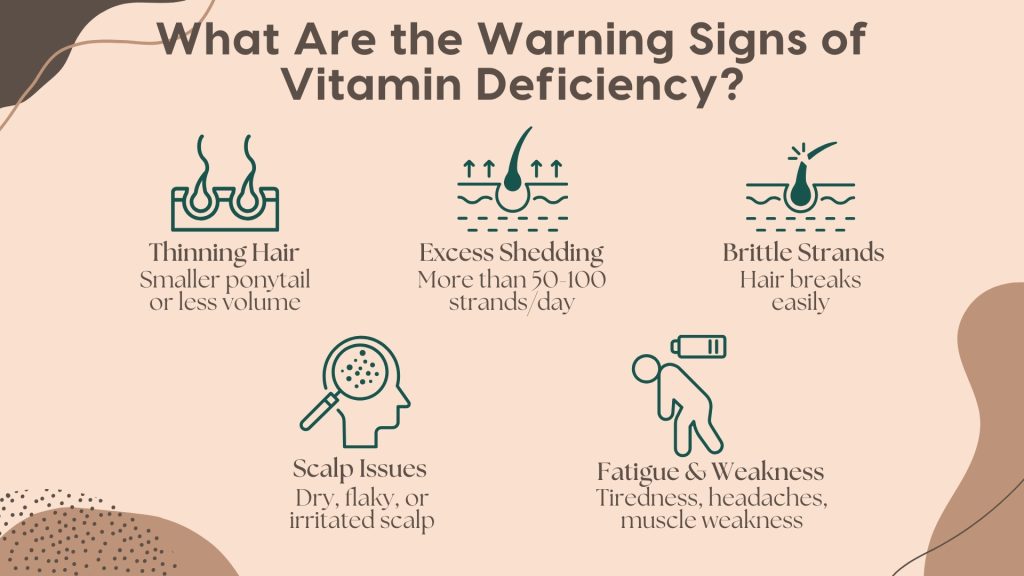
Your hair doesn’t just fall out overnight your body usually gives you signs that something is missing. Some key warning signs to look out for include:
- Is your hair getting thinner? If your ponytail feels smaller or your hair lacks its usual volume, a deficiency may be to blame.
- Are you shedding more than usual? If you’re losing significantly more than the typical 50-100 strands a day, it’s time to pay attention.
- Does your hair break easily? Brittle, weak strands could signal a lack of essential nutrients.
- Is your scalp dry, flaky, or irritated? Vitamin deficiencies can impact your scalp’s health, leading to dandruff or discomfort.
- Are you feeling more fatigued or weak? Hair loss often comes with other deficiency symptoms, such as tiredness, headaches, and even muscle weakness.
Which Blood Tests Can Help Confirm a Vitamin Deficiency?
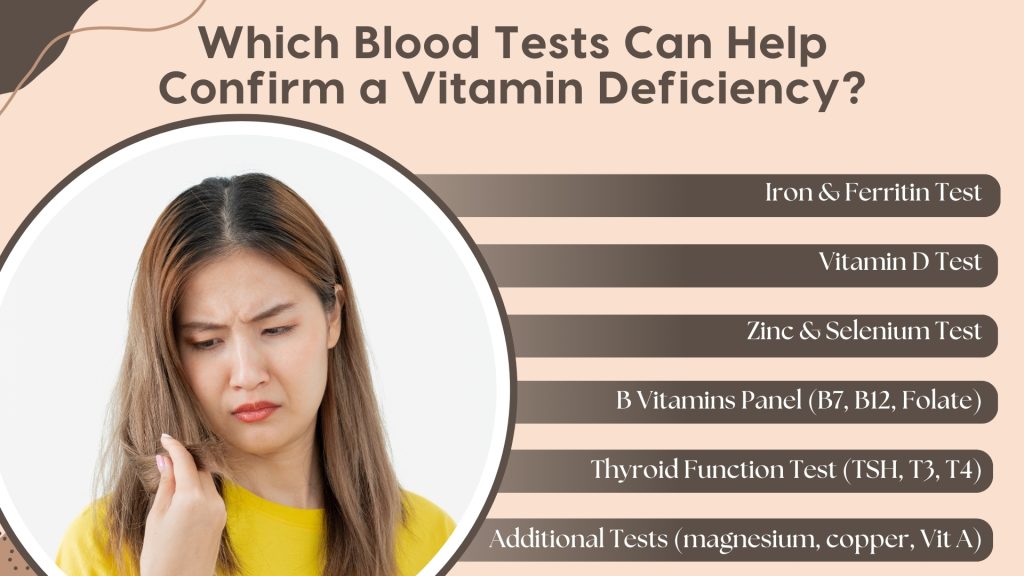
If you suspect a vitamin deficiency, your doctor may recommend a few key tests to get a clearer picture:
- Iron & Ferritin Test: Could low iron be causing your hair loss? Ferritin, which measures stored iron, should ideally be above 30 ng/mL for healthy hair.
- Vitamin D Test: Have you been skipping sun exposure? Low vitamin D levels are linked to conditions like alopecia areata and telogen effluvium.
- Zinc & Selenium Test: These essential minerals support hair follicle repair and growth. Deficiencies may cause increased shedding.
- B Vitamins Panel (B7, B12, Folate): Are you getting enough B vitamins? Biotin (B7) and Vitamin B12 are crucial for cell metabolism and hair regrowth.
- Thyroid Function Test (TSH, T3, T4): Could your thyroid be affecting your hair? Thyroid imbalances often lead to excessive shedding.
- Additional Tests: Depending on your symptoms, your doctor might check for magnesium, copper, or vitamin A imbalances.
How Can Your Diet Give Clues About a Deficiency?
- Are you eating a balanced diet? Restrictive diets (like low-protein, vegan, or crash diets) can lead to deficiencies.
- Do you have digestive issues? Conditions like celiac disease or Crohn’s can prevent proper nutrient absorption.
- Have you recently been sick or stressed? Illness and stress can deplete vitamins faster than usual.
What Does Your Hair Loss Pattern Say About a Deficiency?
Hair loss can be caused by a deficiency in vitamins and minerals, such as iron, zinc, vitamin D, vitamin B12, biotin, folate, and riboflavin. The way your hair is falling out can give clues about what might be missing in your diet.
What Vitamins and Minerals Are Associated with Hair Loss?

- Iron: Low iron levels can contribute to hair loss, especially in menstruating women, people with anemia, and vegetarians or vegans.
- Zinc: Zinc is important for maintaining the immune system, which supports hair growth.
- Vitamin B Complex: Deficiencies in B vitamins are strongly correlated with hair loss.
- Vitamin D: Low levels of vitamin D may contribute to hair thinning.
- Biotin: A lack of biotin can lead to weak and brittle hair.
- Folate: Low folate levels may slow hair regrowth and lead to thinning.
- Riboflavin: A deficiency in riboflavin can also contribute to hair shedding.
Other Causes of Hair Loss Can Be
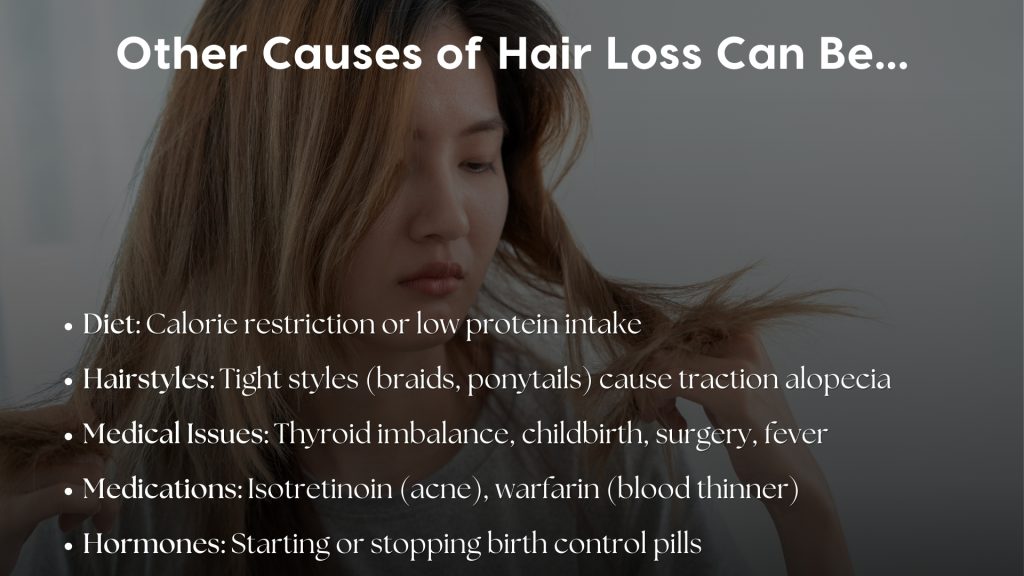
While vitamin deficiencies are a significant factor, they’re not the only reason your hair might be thinning. Other common causes include:
- Calorie restriction or crash dieting that deprives your body of essential nutrients.
- Lack of protein intake, which can weaken hair structure.
- Wearing tight hairstyles (like braids or ponytails), which can lead to traction alopecia.
- Medical conditions such as thyroid imbalances, childbirth, surgery, or a fever.
- Certain medications, including isotretinoin (for acne) or warfarin (a blood thinner).
- Starting or stopping birth control pills, which can trigger hormonal shifts that affect hair growth.
What Can You Do If You Have a Deficiency?
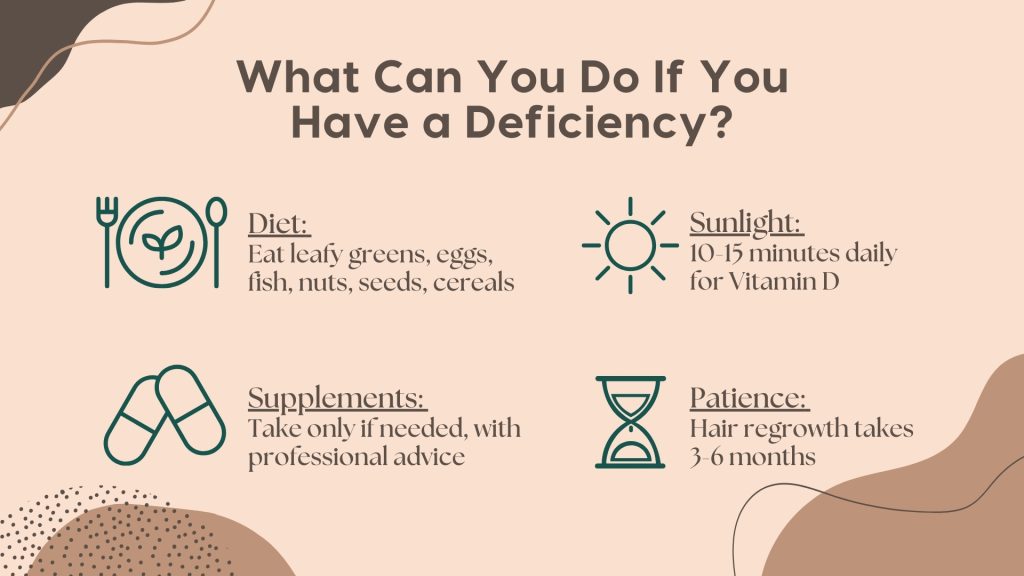
If tests confirm a deficiency, here’s how to start addressing it:
- Adjust Your Diet – Are you eating enough of the right foods? Include leafy greens, eggs, fish, nuts, seeds, and fortified cereals.
- Take Supplements (Only If Necessary) – Are you supplementing wisely? Avoid overloading on vitamins without professional guidance.
- Get More Sunlight – Could you use more vitamin D? Just 10-15 minutes of daily sun exposure can make a difference.
- Be Patient – How long does it take to see results? Hair regrowth usually takes 3-6 months, so consistency is key.
Should You Self-Diagnose or Consult a doctor?
It’s tempting to start taking supplements, but without proper testing, you might do more harm than good. Here’s why:
- Did you know too much Vitamin A can cause hair loss? Balance is essential.
- Excess zinc can lead to copper deficiency, which affects hair health.
- Iron overload can be dangerous and lead to organ damage.
While vitamin deficiencies can contribute to hair loss, they’re rarely the only factor. Genetics, stress, hormonal changes, and lifestyle habits all play a role. The best approach? A well-rounded diet, proper medical tests, and a holistic hair care routine. If your hair loss persists, consult a healthcare professional for personalized advice.












